www.patrickgrant.com
nEWS
05 OCT 08
NYTheatre.com Review of EUREKA! by Mitchell Conway
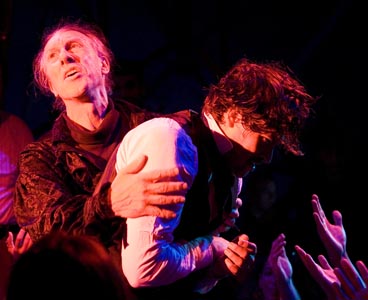
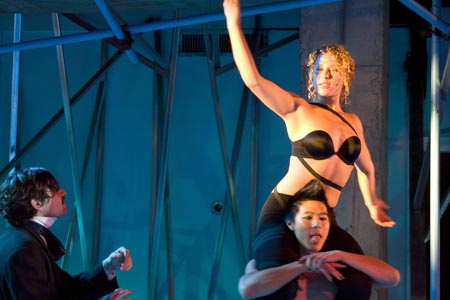
More photos by Jocelyn Gonzales on FLICKR
Eureka! is a fantastic show, unlike anything I've ever experienced. Whatever I describe in this review will in no way satisfactorily replicate the wonderful experience of this production because it is defined by the audience being a part of it. Being it! This performance is not passively "watched" by its audience. It is created by the performers inviting the audience to be an active part of its creation. Although there is a structure to play, most of the specifics are defined by the audience involvement. Over the period of 75 minutes, a crowd of strangers is transformed into a dynamic group singing, dancing, and celebrating the possibilities for humanity. This is truly The Living Theatre.

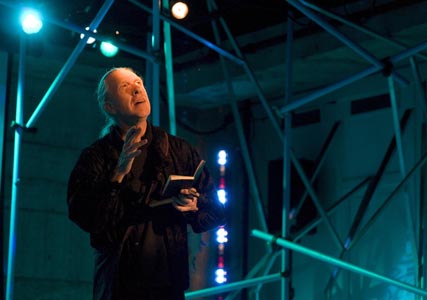
Director Judith Malina has fulfilled the concept of the late Hanon Reznikov, to create an interactive play based on Edgar Allan Poe's prose poem, Eureka. This poem deals with the creation of the universe—the Big Bang as well as its inevitable destruction. The true beauty of this production comes from the parallel between the universe's creation and our own capacity for creation as people.
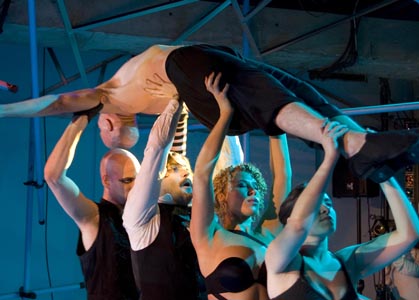
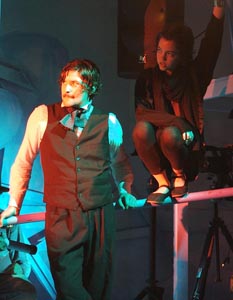
The audience enters the theatre and wanders aimlessly about a dimly lit space with tube-like beams crisscrossing the perimeter (designed by Gary Brackett). There is a low hum, and various space-like electronic sounds filling the room. Along the perimeter, the performers are scattered in stillness up among the pipes, the crew is running sound and lights, and a number of cameramen are filming the wandering audience. Two screens on either side of the room show animated imagery combined with the footage of people from the audience. Edgar Allan Poe, played by Anthony Sisco, is seated, staring intently in contemplation through the audience, bathed in a soft red spotlight.
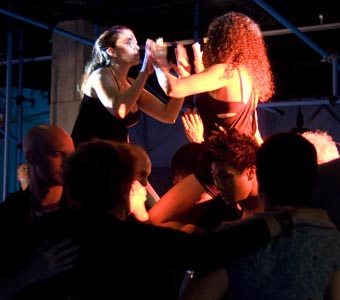
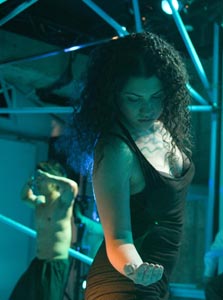
One by one, the performers slowly move from their perches into the floor space. Alexander von Humboldt, played by Silas Inches (a.k.a. Thomas Walker), emerges tapping a small hammer at various points on the floor and on beams. The repeated metallic click-click-click of his hammer penetrates the low hum distinctly yet delicately. Eventually the performers corral the audience into a tight clump at the center of the space. At this point they begin a low hum. Being so close to people, I could literally feel the humming running through my chest. I was compelled to hum along. The pitch slowly rises, and the performers lead the way raising jiggling hands. As the music (by Patrick Grant) climaxes, the group waving their hands in the air begins to break apart and expand, in a superb recreation of the Big Bang that the entire audience could feel ring through their bones. This beginning, especially after allowing the time for the audience to become slightly eager in the period of inaction preceding it, was breathtaking.

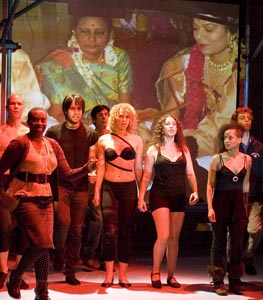
The first time the audience was asked to speak was when the performers asked what elements we felt like. The periodic table appeared on the screen and performers began by naming their respective elements in the form of a song. But once prompted, "Phosphorus!" one man hollered. "Gold!" a woman exclaimed! After many declared their elements accompanied by a representative gesture, one man excitedly called out "Wind!" as the element he connected with. To which a performer politely said, "Okay, how about Oxygen? Oxygen!"

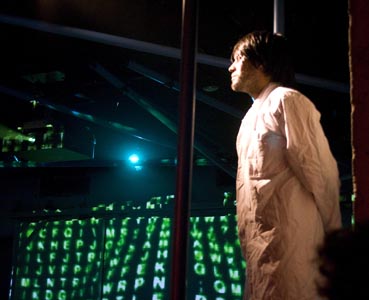
Similar sections developed, each engaging the audience differently, and progressively asking for more initiation of the action. There was always a gentle invitation, a soft hand against the shoulder, an outreached arm with open eyes looking into mine asking for me to join, and this generosity on the part of the performers is what allowed the audience to become comfortable enough with the situation to become fully engaged in it. There was an environment where we were given the opportunity to give a little bit of ourselves to each other. The performers' fearless giving served as model for how the audience was permitted to treat them and each other.

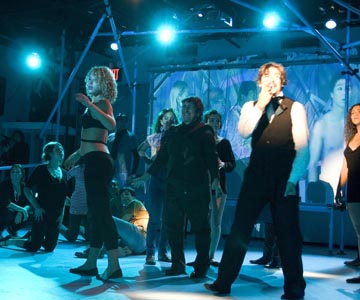
The effect this had on the members of its audience was in many cases astounding. I watched a man leaning skeptically cross-armed against pillar for much of the beginning of the show, but by the end he was frolicking around the space, singing at full volume, grabbing people he didn't know to frolic and dance with him, and wearing an expression of utter jubilation.

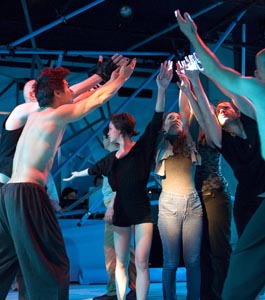
The production was constantly raising questions such as: How does zero become one? Is there any point in living when we know we will end in annihilation? Is not destruction inherent in creation? Poe sporadically recites passages from the prose poem, and Humboldt brings up similarly important queries on the matter of meaning. But the answer was apparent that we were the creators of meaning. We have the possibility to offer our hands to each other and create something greater. We could just as easily wander aimlessly, disconnected, as the audience did at the beginning of the show. But after seeing the possibility of offering a hand to a stranger without fear, we are made aware of what we can create if we are willing. The terrifying void is not worth being afraid of. Emptiness is not merely nothing; it is the potential for something.

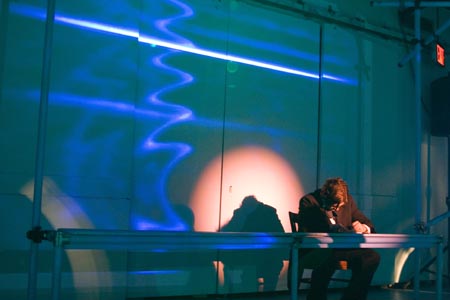
The profundity of its interactivity coupled with the grand scope of its content is remarkably intelligent and undoubtedly visionary. This play is personal, social, political, philosophical, spiritual, and a lot of fun. Judith Malina and the Living Theatre have some true wisdom to share in this production. The wisdom that you have the wisdom. You may know the science of the big bang already, but you've never experienced it like this before. - NYTheatre.com
EUREKA!
Based on the prose poem by Edgar Allan Poe
The Living Theatre
Oct. 1 to Nov. 9, 2008
Directed by Judith Malina
Original Music by Patrick Grant
Design by Gary Brackett
Tech Director Evan True
Asst. Director Brad Burgess
21 Clinton Street
(Ave. B south of Houston)
New York, NY 10002
Performances are on Wednesdays through Saturdays at 8 p.m.; Sundays at 4 p.m. Tickets are $20 with a discounted ticket of $15 for students & seniors. Wednesdays are always pay-what-you-can. The production involves audience interaction, so there are no seats and each performance can only accommodate 50 people.
The Living Theatre begins its 2008-2009 season with the limited run of Judith Malina and Hanon Reznikov's Eureka!, based on an Edgar Allan Poe essay about the origin of the Universe.
The production is directed by Judith Malina and features an original score by Patrick Grant.
Set & Lighting Designer is Gary Brackett, Technical Direction is by Evan True. Choreography is by Gene Ardor. The Assistant Director is Brad Burgess.
Published in 1847, the "Prose Poem," as Poe called it, lays out with astonishing forethought what has since come to be called the Big Bang Theory. The Living Theatre has adapted Poe's text to a theatrical form, which will provide the audience with an awareness of participating actively in the creation of the universe and realize the parallel between the development of the elements of the cosmos and our own human development.
Eureka! was conceived and written by Hanon Reznikov when he read Poe's text - but he did not live to finish the task. Judith Malina, his collaborator and the director of the play completed the script.
The purpose of the play is to provide the audience with a sense of empowerment. By participating in the creation of the known universe we communicate the possibility of creating a more harmonious social structure. 'Eureka!' joins nearly one hundred Living Theatre productions created since 1951, all of which seek to expand our knowledge of the universe.
The cast of Eureka! features Anthony Sisco as Edgar Allan Poe, Silas Inches (Thomas Walker) as Alexander von Humboldt, Gene Ardor, Yasemin Ozumerzifon, Eric Olson, Maia Larraz, Erin Downhour, Kennedy Yanko, Enoch Wu, Katherine Nook, Isaac Scranton, Eitan Brigantonelli, and you the audience.
=================================================